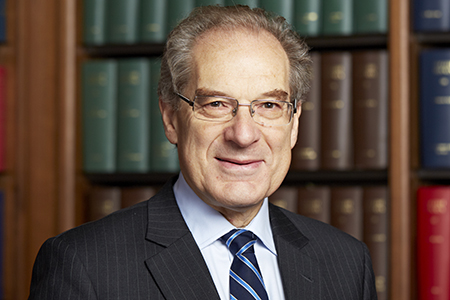News release 07/2017
Lord Mance named Deputy President of the Supreme Court
20 September 2017
Lord Mance has been appointed Deputy President of the Supreme Court, it was announced today.

The appointment was made by Her Majesty The Queen on the recommendation of the Prime Minister and Lord Chancellor, following the recommendation of an independent selection commission.
Following his appointment today, Lord Mance said: "It is a privilege to succeed Lady Hale as Deputy President of the Supreme Court after her appointment as President. I look forward to playing my part in the leadership of the Court and in furthering the collaborative relationships which exist with the President, with the Chief Executive and within the Court generally, as well as to promoting the Court's role and activities both as an established institution in our national life and internationally".
Lord Mance is one of the original Supreme Court Justices who moved to the Court from the House of Lords in 2009 when the Court first opened. He became a Lord of Appeal in Ordinary in 2005. From 1999 to 2005 he was a Lord Justice of Appeal and from 1993 to 1999 a Judge of the High Court, Queen's Bench Division, where he also sat in the Commercial Court.
He read law at University College, Oxford, spent time with a Hamburg law firm and then practised at the commercial bar and sat as a Recorder until 1993. He chaired various Banking Appeals Tribunals and was a founder director of the Bar Mutual Indemnity Insurance Fund. He represented the United Kingdom on the Council of Europe's Consultative Council of European Judges from 2000 to 2011, being elected its first chair from 2000 to 2003.
The position of Deputy President was previously held by Baroness Hale of Richmond and became vacant following her appointment as President of the Supreme Court. Today, Lady Hale welcomed Lord Mance's appointment, saying:
"I am delighted to welcome Lord Mance as my successor as Deputy President of the Court. He has already made a huge contribution; as a Presider and as the lead Justice for our international relations with other courts and judicial networks. I am sure that together we shall make a great team."
The role of Deputy President involves working alongside the President to oversee the judicial work of the Court, and liaising closely with the Chief Executive who manages the Court's administration. The Deputy President also shares a wider leadership and ambassadorial role with the President, undertaking a range of engagements to promote understanding of the role of the judiciary and senior appellate courts in the UK and to foster international links.
Lord Mance will be officially sworn in as Deputy President at a special ceremony at the Supreme Court on 2 October 2017.
About the appointments process
1. The selection process for the Deputy President position is mostly set out in statute (the Constitutional Reform Act 2005). In short, the steps usually undertaken by the independent selection commissions (once convened by the Lord Chancellor) are:
- Consultation with the Lord Chancellor on the positions to be advertised and the process of selection.
- Candidates are invited to submit a personal statement. The basic eligibility criteria are set by Parliament.
- The statute also requires that the Lord Chancellor, the First Minister in Scotland, the First Minister in Wales, the Judicial Appointments Commission in Northern Ireland and senior judges across the UK are consulted as part of the selection process.
- Candidates are interviewed by the commission. Under changes introduced by the Crime and Courts Act 2013, where two candidates are deemed to be of equal merit, the commission can give preference to one candidate over the other for the purpose of increasing diversity within the Court.
- After interviews, a report is sent to the Lord Chancellor for his consideration. There is another round of consultation with the senior politicians and judges. The Lord Chancellor then accepts the recommendation(s), or can reject it, or ask the commission to reconsider.
- When the Lord Chancellor accepts a recommendation, the name is notified to the Prime Minister and HM The Queen. Candidates are informed of the outcome, and the Prime Minister's Office then makes an announcement.
2. The launch of the Deputy President competition was announced on the Supreme Court website on 21 July 2017. The application process was limited to the 12 Justices of the Supreme Court, given that, with the three new appointments announced in July, the Court had reached its statutory maximum of 12 Justices.